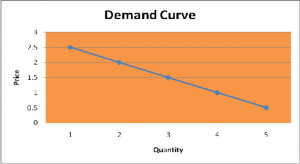Budget, Income and Substitute
Consumers spend their available income or budget to maximize their utility. Utility means enjoyment or satisfaction. A consumer receives the marginal utility by consumption of an additional unit of a good or service. This marginal utility diminishes as more consumed in a given period of time. Consumers maximize their utility, when the marginal utility per dollar for each good consumed is equal. Consumers have a limited amount of income or constraint budget to spend for maximizing their utility. In the income effect, if prices decrease, the quantity demanded of a normal good increases but the quantity demanded of an inferior good decreases. In the substitution effect, a decrease in price increases the marginal utility per dollar of the good (Gwartney, Stroup, Sobel & Macpherson, 2008). In this University MBA Degree Online case, a decrease in price of good will increase the quantity demanded of this good and decrease the quantity demanded of substitutes for this good and vice versa.

Influence of Endorsement on Demand Curve
Some consumers receive utility from consuming goods that are popular in their views. In most of cases, consumer buying behavior depends on the type of person, who uses a particular product. Celebrity endorsement helps to induce consumers to buy products because they want to buy products associated with celebrities. It is because using these products makes them feel closer to the celebrity endorsers or more fashionable. It is more beneficial, when endorser is more knowledgeable about the product (Bernheim, 2009). In this George Foreman Boxer case study help, Foreman soon became thought of as the expert on this product and this type of cooking. It influences the demand curve in positive manner and shifts to right side.
Rationality of Buying Decision
People make decision related to purchasing a good that doesn’t appear to be economically rational. They are unrealistic about their future behavior. In concern of any product, buying decision can be said rational, when it provides required features or benefits in order to fulfill the need of customer. With this, it should be economical, if there are budget constraints. In economic point of view, this decision regarding to purchase product cannot be said rational because consumer don’t think prior to purchase that it is under the available budget or not. However, consumer would like to maximize the utility and decrease the consumption of other substitute product to prefer this product. In sense of behavioral economics, this decision can be considered rational (Pollock, 2006).

References
Bernheim, B. D. (2009). Microeconomics. New York: McGraw-Hill Education.
Gwartney, J. D., Stroup, R. L., Sobel, R. S. & Macpherson, D. A. (2008). Economics: Private and Public Choice. USA: Cengage Learning.
Hubbard, R. G. (2006). Microeconomics. South Africa: Pearson Education.
Pollock, J. L. (2006). Thinking about Acting: Logical Foundations for Rational Decision Making. UK: Oxford University Press.
